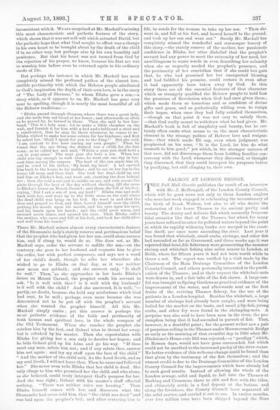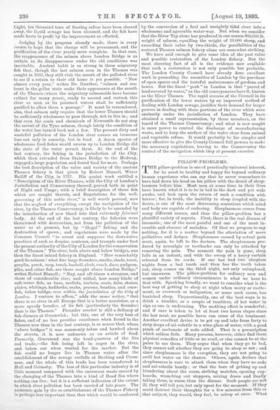SALMON AT LONDON BRIDGE.
THE Pall Mall Gazette publishes the result of an interview with Mr. J. McDougall, of the London County Council, which will be good news not only to those London anglers who were last week engaged in celebrating the tercentenary of the birth of Izaak Walton, but also to all who desire the restoration of the lower Thames to its ancient purity and beauty. The dainty and delicate fish which naturally frequent tidal estuaries like that of the Thames, but which for many years have refused to enter its polluted waters beyond the point at which its rapidly widening banks are merged in the, coast- line itself, are once more ascending the river. Last year it was found that whitebait, small crabs, shrimps, and other fish had ascended as far as Gravesend, and three weeks ago it was reported that bond-fide fishermen were prosecuting the summer shrimp and whitebait fishing nine miles nearer to London, at Erith, where for fifteen years it had not been worth while to throw a net. The report was verified by a visit made by the Chairman of the Main Drainage Committee of the London County Council, and others personally interested in the purifi- cation of the Thames ; and at their request the whitebait-nets were drawn in, and a fair take of the fish shown. A large can- f ul was brought to Spring Gardena as practical evidence of the improvement of the water, and afterwards sent as the first fruits of the reviving Thames fishery, for the use of the patients in a London hospital. Besides the whitebait, a large number of shrimps had already been caught, and were being boiled for the market on the boats, and small jelly-fish, young crabs, and other fry were found in the shrimping-nets. A .porpoise was also said to have been seen in the river, the pre- sumption being that it had ascended in pursuit of fish. That, however, is a doubtful point ; for the present writer saw a pair of porpoises rolling in the Thames under Hammersmith Bridge as early as the morning of that eventful day in 1886 when Mr. Gladstone's Home-rule Bill was rejected,—a " prodigy " which, in Roman days, would not have gone unrecorded, but which could not be ascribed to the increased purity of the river-water. No better evidence of this welcome change could be found than that given by the testimony of the fish themselves ; and the utmost credit is due to the Drainage Committee of the London County Council for the improvements which have already led to such good results. Instead of allowing the whole of the London sewage, solid and liquid, to fall into the Thames at Barking and Crossness, there to ebb and flow with the tides, and ultimately settle in a foul deposit at the bottom and along the foreshore, the County Council have separated all the solid matter, and carried it out to sea. In twelve months, over two million tons have been shipped beyond the Nore Light, ten thousand tons of floating refuse have been cleared away., the liquid sewage has been cleansed, and the fish have made haste to profit by the improvement so effected.
Judging by the progress already made, there is every reason to hope that the change will be permanent, and the purification of the river yearly more complete. In that case, the reappearance of the salmon above London Bridge is as certain as its disappearance under the old conditions was inevitable. Ancient habit is so strong in these migratory fish that, though the last salmon seen in the Thames was caught in 1833, they still visit the mouth of the polluted river to see if a return to their old home is yet possible. "Now almost every year," writes Dr. Gunther, " salmon and sea- trout in the grilse state make their appearance at the mouth of the Thames (where the migratory salmonoids have become extinct for many years), ready to ascend and restock this river as soon as its poisoned waters shall be sufficiently purified to allow them a passage." It must be remembered, also, that salmon only require that the lower Thames should be sufficiently wholesome to pass through, not to live in ; and that even the coals and chemicals of Newcastle do not stop the ascent of the Tyne salmon, though lately the condition of the water has turned back not a few. The present dirty and wasteful pollution of the London river causes an immense loss not only in amenity, but in food. A dozen species of wholesome food fishes would swarm up to London Bridge did the state of the water permit them. At the end of the last century, the fishing in the jurisdiction of the City, which then extended from Staines Bridge to the Medway, engaged a large population and found food for more. Perhaps the best description of the value and variety of the ancient Thames fishery is that given by Robert Binnell, Water Bailiff of the City, in 1757. His quaint work entitled a "Description of the River Thames, with the City of London's Jurisdiction and Conservancy thereof, proved both in point of Right and Usage ; with a brief description of those fish which are caught therein, and Regulations for the well- governing of this noble river," is well worth perusal, now that the neglect of everything, except the navigation of the river, by the Thames Conservancy, is likely to be amended by the introduction of new blood into that extremely faineant body. At the end of the last century, the fisheries were threatened with destruction, not from the pollution of the water as at present, but by " illegal " fishing and the destruction of spawn ; and regulations were made by the Common Council " to arrest and suppress the destructive practices of such as despise, contemn, and trample under foot the present authority of the City of London for the conservation of the Thames." The river, both above and below bridges, was then the finest inland fishery in England. "How remarkably good its salmon ! what fine large flounders, smelts, shads, trout, graylin, perch, carp, tench, barbell, chub, roach, dace, gudgeon, pike, and other fish, are there caught above London Bridge," writes Robert Binnell ; " Nay, and oft-times a sturgeon, and those of considerable size; and withal, hew many kinds of salt-water fish, as bass, mullets, turbets, seals, dabs, skates, plaice, whitings, haddocks, crabs, prawns, buntins, and craw- fish, below bridge, even within the jurisdiction of the City of London. I venture to affirm," adds the same writer, " that there is no river in all Europe that is a better nourisher, or a more speedy breeder, of its fish (particularly the flounder) than is the Thames." Flounder sottehet is still a delicacy of fish-dinners at Greenwich ; but this, one of the very best of fishes, and of no less peculiar excellence when found in the Thames now than in the last century, is so scarce that, where "above bridges" it was commonly taken and hawked about the streets, it is now unknown as an article of food. Formerly, Gravesend was the head-quarters of the live cod trade,—the fish being left in cages in the river, and taken out when wanted for the market. But the fish could no longer live in Thames water after the establishment of the sewage outfalls at Barking and Cross- ness, and the whole of this trade has been transferred to Hull and Grimsby. The loss of this particular industry is of little moment compared with the enormous waste caused by the changing of the Thames into a kind of Dead Sea where nothing can live ; but it is a sufficient indication of the extent to which river pollution has been carried of late years. The economic gain by the re-establishment of the Thames Fishery is perhaps less important than that which would be conferred by the conversion of a foul and unsightly tidal river into a wholesome and agreeable water-way. But when we consider that the River Tay alone has produced in one season 800,000 lb. weight of salmon, equalling the weight of 18,000 sheep, and exceeding their value by two-thirds, the possibilities of the restored Thames salmon fishery alone are somewhat striking.
We have said enough to give some idea of the past value and possible restoration of the London fishery. But the most cheering fact of all is the evidence now available that such a restoration is not only possible but probable. The London County Council have already done excellent work in promoting the amenities of London by the purchase- of open spaces and the tasteful maintenance of gardens and lawns. But the finest " park " in London is that " parcel of land covered by water," as the old conveyancers have it, known as the River Thames. The rapid success of the Council in its purification of the lower waters by an improved method of dealing with London sewage, justifies their demand for larger• powers in dealing with those portions of the river which were anciently under the jurisdiction of London. They have obtained a small representation, by three members, on the board of the Thames Conservancy ; and what is now sought is more power to control the discharge of manufacturing waste, and to keep the surface of the water clear from animal and vegetable refuse. It would probably be far simpler and more effective to give the County Council full powers to make- the necessary regulations, leaving to the Conservancy the control of the navigation which they at present exercise.



































 Previous page
Previous page